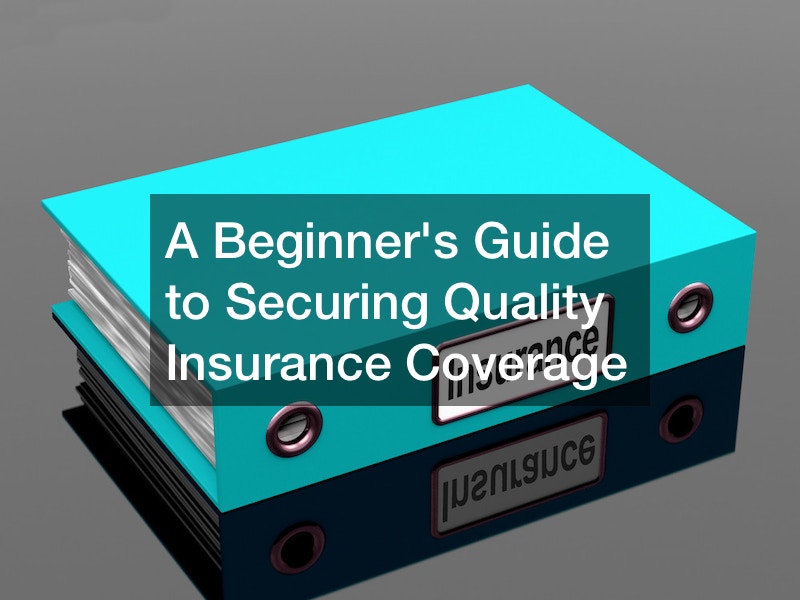
Insurance is an essential financial safety net that protects individuals, families, and businesses from unexpected and potentially devastating events. The right insurance plan can cover your home, health, vehicles, or company. But your options are many, making finding the right coverage a challenge. This guide explores everything about insurance to help you secure quality insurance coverage. Let’s start with the basics of insurance.
What is Insurance?
Insurance is a legal arrangement or contract between an insurance company and a policyholder in which the insurance company agrees to reimburse or compensate the policyholder against losses. The insured (the individual or business receiving the coverage) must pay a certain amount (premiums) to keep the policy active. In an unfortunate event, such as an accident or death, the insurer will pay a predetermined sum to the insured for the damages.
Before buying a policy, you need to understand many things about insurance, but that’s not our primary focus today. We just want to focus on the types of insurance coverage. Let’s look at the different types of insurance plans to help you find quality insurance coverage.
Understanding the Different Types of Insurance
Insurance can help you manage the financial risks linked with unexpected events. However, it only works if you buy the right insurance plan. Therefore, before insuring yourself, your house, or your business, it’s essential to understand the different types of insurance and what they cover. Let’s discuss the various insurance plans.
Health Insurance
Your health is more important than anything else on this earth. Therefore, you want to protect it at all costs—and one of the best ways to do so is to get health insurance. According to Statista, over 300 million Americans have some form of health insurance. Unfortunately, approximately 30 million people in the U.S. still don’t have health insurance. If you’re among the last group, we hope this post will convince you to get quality insurance coverage for your health.
Health insurance is a type of insurance that covers medical-related expenses. This includes costs for doctor visits, hospitalization, prescription drugs, and other healthcare services. Everyone needs health insurance because you never know when you’ll be sick and the type of treatment you’ll need. And with the rising healthcare costs worldwide, health insurance can be a huge lifesaver.
Benefits of Health Insurance
A healthcare insurance policy provides financial coverage for medical expenses, especially emergencies. But some people don’t get sick so often. So, they see no reason for this type of coverage. Here’s why you need health insurance.
- Access to medical care:
When you’re sick, you can’t get the necessary medical attention if you have no money to pay for it. Healthcare insurance gives you access to medical professionals, specialists, and facilities when needed
Health insurance covers emergency room visits during an unforeseen medical crisis
Your health insurance plan may cover dermatology services for skin conditions and treatments depending on your insurer and the type of plan
- Preventive care:
Your health insurance may cover preventive services like screening, vaccinations, and wellness check-ups
It’s worth noting that some health insurance plans are restricted to specific illnesses. As a result, they may not cover some diseases. For instance, most plans don’t cover cosmetic surgeries, pre-existing conditions, infertility/pregnancy-related complications, and expenses incurred on alternative therapies. Therefore, it’s essential to review your plan before purchasing it.
The cost of health insurance varies depending on various factors like your plan, insurance company, and age. Typically, you must pay monthly premiums to keep your plan active. For instance, if you’re 30, you’ll likely pay an average of $436 for an exclusive provider organization (EPO) program, $390 for a health maintenance organization (HMO), and $458 for a preferred provider organization (PPO). But your main goal should be getting quality health insurance coverage.
Auto Insurance
If you have a vehicle of any type, it’s vital to protect it with some form of insurance. In fact, in some areas, auto insurance is mandatory for all vehicle owners. This type of insurance offers coverage for accidents, vehicle damage, and liability in case of injury to others. Auto insurance plans vary significantly in terms of coverage and benefits. It all boils down to your vehicle type and how much you’re willing to pay for insurance.
Auto insurance offers liability protection if you get into an accident and cause injury and damage to others. It also covers vehicle repairs after an accident or collision. If your vehicle is damaged beyond repair, or if the repair cost exceeds the cost of buying a new one, the insurance company may decide to get you another car. Many plans offer towing and vehicle recovery services if your car breaks down or is involved in an accident.
Also, with auto insurance, you don’t have to worry about flat tires or battery jump-starts. If you experience such issues and can’t get a mechanic nearby to help you, your auto insurance will help. However, you must ensure that your plan includes roadside assistance. It’s one of the elements of quality insurance coverage for your vehicle.
So, how much do you pay for auto insurance? According to Bankrate, drivers in the U.S. spend an average of $168 for full coverage and $52 for minimum coverage—these are monthly cost estimates. However, the premiums you pay for your car insurance vary based on factors like vehicle type, model and age, type of insurance plan, and your insurance company.
It’s worth noting that there are various types of vehicle insurance plans, each with specific coverage options. For instance, third-party liability covers the cost of repairs/replacements, the cost of hospitalizations and treatments, and liabilities from the death of third parties. Therefore, it’s essential to understand each plan before choosing the right one for your vehicle.
Home Insurance
Buying a home is a significant long-term investment. Therefore, any homeowner will be willing to pay all the costs to protect their homes against any potential losses and damages. One way to protect your home is by buying home insurance.
Home insurance, sometimes called homeowner’s insurance, protects your home and belongings against damage or loss due to theft, disasters, or accidents. This type of insurance may also provide liability coverage if someone is injured on your property. A homeowner’s is a quality insurance coverage every homeowner needs to protect their investment.
But why do you need home insurance? The most basic reason is to protect your home against losses or damage. However, there are other advantages you may get from having a homeowner’s insurance. They include:
- Property coverage:
Homeowner’s insurance covers your home’s structure. This includes your house, kitchen, bathroom, garage, and any structure that sits on your property. The policy also covers personal belongings, including furniture, appliances, and electronics
- Natural disaster coverage:
If a natural disaster like floods destroys your home, a homeowner’s insurance will provide coverage for an emergency flood service
- Foundation repairs:
Foundation issues can grow into a disaster quickly. That’s why addressing them before they escalate into something out of control is essential. This is also the reason insurance companies are willing to offer coverage for foundation repairs. The signs are often visible, but only if you know what to look for
However, foundation issues are not something to ignore. They can cost you more than your insurance plan can pay for, for instance, your life. Therefore, it’s important to take steps to prevent these issues. For example, consider hiring a basement waterproofing contractor to seal your basement and avoid water damage
Pests can be a nuisance at home. And the cost of removing them can be significant. Luckily, your home insurance can cover pest infestations and necessary pest control services
How much is a homeowner’s insurance? Business Insider says the average homeowners insurance premium in the U.S. is $1,428 per year. However, this varies depending on your home’s value, location, and coverage amount. When it comes to home insurance, you want to ensure quality insurance coverage.
Business Insurance
Running a business is all about taking risks. After all, the bigger the risks, the sweeter the returns (but not always). But as a business owner, you don’t want to take all the risks alone. You need someone who can help you carry your business risks—which is what business insurance does.
Business insurance is a type of insurance that protects your business from various risks, including property damage, liability claims, and employee-related issues. It helps you safeguard your investment and ensure the continuity of your operations. When buying business insurance, focus on getting quality insurance coverage.
So why do you need business insurance? According to a survey by Insureon, one in three small businesses face top hazards, including employee injury, contract disputes, theft, fire, storm damage, and products that cause injury or damage. Unfortunately, close to 40% of businesses lack any form of insurance. So whenever they face these hazards, they must pay all the costs out of pocket or from their business revenues.
Business insurance offers coverage for legal fees and damages if your business is held liable for property damage or injuries. For instance, if a structure on your business premises collapses and causes harm to someone, your insurance will have to pay for all the costs. Business insurance covers physical assets like equipment, buildings, inventory, and signage.
Generally, business insurance helps minimize financial losses that could ruin your business operations. For instance, it can help you cover the costs of repairs or replacements, legal costs, and costs caused by downtime, among others. Therefore, if you run any business, small and large, it’s important to secure quality insurance coverage.
Remember, there are various types of business insurance, including commercial property insurance, business income insurance, professional liability insurance, and worker’s compensation insurance. While you don’t need all these insurance types, some are must-haves. Your choice will depend on your business type, capacity, resources, and budget.
Finding the Right Insurance Plan
You don’t just wake up one day and decide you need health insurance or a worker’s compensation policy. This is true, especially for policies that aren’t mandatory. With the many insurance companies available today and the different insurance plans, finding quality insurance coverage might seem daunting, but it shouldn’t be. Here are some tips to help you secure quality insurance coverage.
Assess Your Needs
You can’t buy auto insurance if you don’t have a car. The same goes for home and business insurance. At the same time, not everyone with a home needs homeowner’s insurance. It all has to do with your personal needs.
Therefore, before buying any type of insurance, you must assess your needs. Try to determine the type of risks you’re likely to face and the type of insurance plan that might cover those risks. You might consider things like your health, your property’s value, and potential liabilities. This will help you determine the right type of insurance and the level of coverage needed.
Pick the Right Insurance Provider
The insurance industry has snowballed. As a result, it has invited many players with different intentions. Therefore, you must be careful when looking for an insurance company. Don’t just settle with the first option you get. Instead, get recommendations, read online reviews, and do background checks before agreeing with an insurance provider. Also, it’s best to request an insurance quote from your insurance company before agreeing to their terms.
Read the Fine Print
Every insurance plan has terms and conditions that must be met to remain active and applicable. So, before putting pen to paper on an insurance contract, ensure you read and understand the terms and conditions. You want to know all the exclusions, limitations, and the claims process.
Whether you need health, auto, home, or business insurance, you must be careful with the type of policy you buy. You should focus on getting quality insurance coverage for your health, property, or investment. The above are just but a few insurance plans to consider. If you have any questions about getting the right insurance plan, feel free to contact us.







